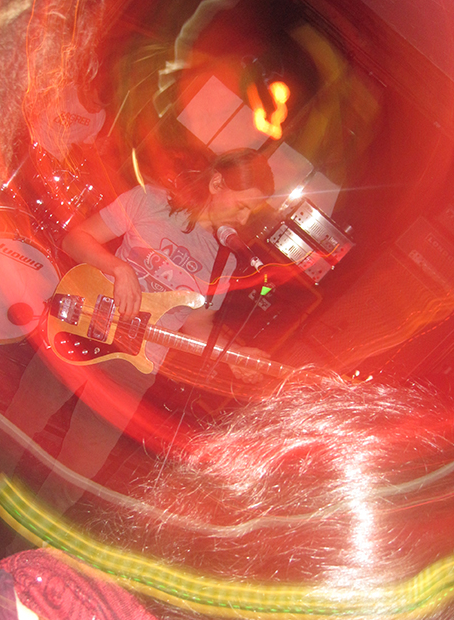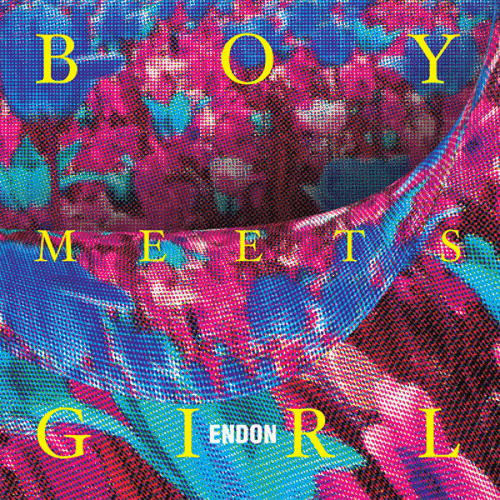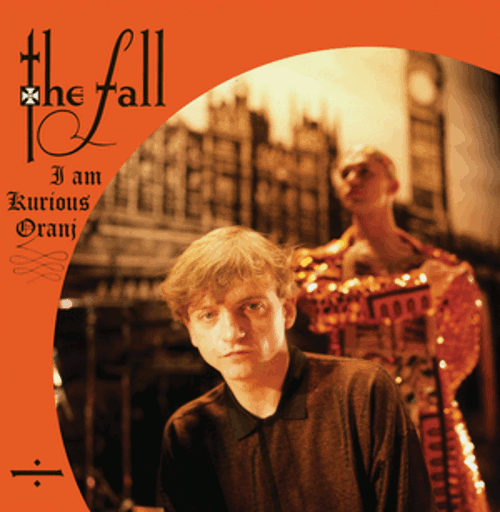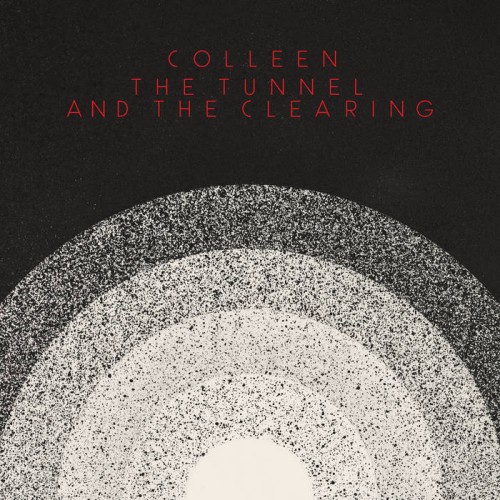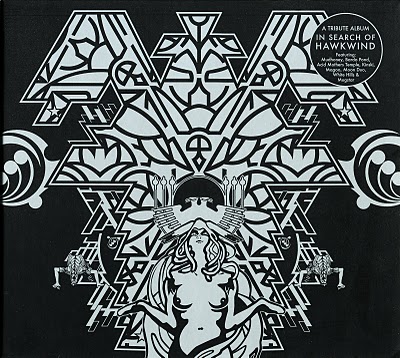 In Search of Hawkwind is a tribute album, whereby nine venerable old battle hymns originally cranked out by the veteran psychedelic cosmonauts are re-interpreted by younger, hipper bands, mostly from the US (at least I think so — I’m not actually hip enough to have heard of all of them). There have been other Hawkwind tributes, but they’ve tended to be low-budget releases featuring deservedly obscure free festival-type acts, though the likes of Acid Mothers Temple (of whom more below) and Wire’s Colin Newman have popped up on them too. This looks to be a bigger-league affair, nicely packaged and featuring a couple of biggish names in Mudhoney and the aforementioned Acid Mothers, alongside established neo-psych stalwarts Bardo Pond and a clutch of younger acts: Kinski, Mugstar, White Hills, Magoo, and Wooden Shijps offshoot Moon Duo.
In Search of Hawkwind is a tribute album, whereby nine venerable old battle hymns originally cranked out by the veteran psychedelic cosmonauts are re-interpreted by younger, hipper bands, mostly from the US (at least I think so — I’m not actually hip enough to have heard of all of them). There have been other Hawkwind tributes, but they’ve tended to be low-budget releases featuring deservedly obscure free festival-type acts, though the likes of Acid Mothers Temple (of whom more below) and Wire’s Colin Newman have popped up on them too. This looks to be a bigger-league affair, nicely packaged and featuring a couple of biggish names in Mudhoney and the aforementioned Acid Mothers, alongside established neo-psych stalwarts Bardo Pond and a clutch of younger acts: Kinski, Mugstar, White Hills, Magoo, and Wooden Shijps offshoot Moon Duo.
The current incarnation of Hawkwind recently celebrated forty years of existence – or rather, forty years of Dave Brock leading a band of that name, the other personnel being on a continual in-again, out-again merry-go-round over the years. Perhaps unsurprisingly, however, all the tracks covered here date from the first five years of those four decades: the period 1970-75, during which the band mined a golden vein of, for the most part, crushingly heavy trance-rock, spiced with lashings of unschooled and unhinged experimental electronica, and leavened with touches of folk and prog. It’s a relief to see that nobody plumped for the obvious choice of their sole hit single, the psychedelic biker-rock novelty song “Silver Machine;” instead this album delves into the far meatier album tracks of this period. Having said which, most of the selections will still strike the long-term Hawk-freak as fairly safe and/or obvious choices, although in itself that’s not necessarily a bad thing. The most surprising choice is “Be Yourself,” a rudimentary ur-chant that Hawkwind themselves probably haven’t played live in around 39 years. It’s tackled here by New York’s White Hills, whose main innovation is to preface the track proper with a few minutes of enjoyably lysergic guitar meltdown.
There are two things about this album I like very much. The first is the cover, which features some of the most tasteful Hawkwind-related artwork in existence: an elegant black-and-silver number that incorporates a range of classic Hawkwind logos and motifs into a single design. It looks so good I would even consider sporting it on a t-shirt. The second is Bardo Pond’s contribution, a terrific rendering of “Lord Of Light,” where the original’s riff and rhythm are subtly altered, without any loss of intensity, and a female singer (presumably Isobel Sollenberger, although there’s no line-up information included for any of the bands) plays up the invocatory, incantatory aspect of the vocal melody. The result is a compelling alternate take on Hawkwind’s patented fusion of proto-cyberpunk and shamanistic atavism. In fact the CD is probably worth owning for this track alone.
That’s just as well, because elsewhere things never quite take off as one might have hoped. Mudhoney deliver a full-sounding, muscular take on “Urban Guerilla” (an incendiary and quite brilliant song that deserves to be far better known), but their efforts are weakened by the singer being pushed unaccountably low in the mix, such that the tightly wound malevolence of Robert Calvert’s original vocal is entirely lost. And, in fact, a similar mixing technique has been applied to a whole slew of tracks across the CD: vocals little more than a faint, effects-laden burr: a ghostly, burnt out echo struggling for audibility beneath a throb of bongtastic guitar noise. Presumably this is thought to convey the right kind of spaced-out vibe, and it may also be that many of these bands don’t see vocals as their strong suit. But the album suffers as a consequence: these tracks were not conceived as mere riff-driven freakouts: these are songs.
Still, there’s stuff to enjoy. Like Bardo Pond, Kinski tamper slightly with their chosen riff, but given that in their case it’s the definitively sacred chord sequence to “Master of the Universe,” this may not have been wise, although some squalling lead guitar gives the track enough energy to pass muster. Mugstar’s take on “Born To Go” has plenty of energy too – they don’t do anything terribly novel, just play it fast, loud, and punky, but it suits the song, and is one of the more convincing things here. But their attempt at “Paradox” (they are the only act here to get two tracks) follows a similar template, and here the approach doesn’t convince, as one of Dave Brock’s most affecting slices of cosmos-weary melancholia is reduced to mere rifferama-by-numbers, although there’s a suitably intense instrumental coda to perk things up and bring the album to an appropriate close.
Some acts have tried harder to reinvent the source material: Magoo’s “Space is Deep” positions the track somewhere between stoner metal and blissed-out American indie-pop, but it feels a lightweight confection in comparison to both the original and the better tracks here. The most radical reworking is Moon Duo’s take on “Hurry On Sundown,” which is all but unrecognizable, being recast as a minimalist synth drone with fragmentary, echo-laden vocals, the result sounding so much like Suicide that Rev and Vega could probably sue. Bold musical experiment and unoriginal pastiche, all in one package.
Which brings us to Acid Mothers Temple, probably the biggest name here, at least as far as the target audience is likely to weigh things. They tackle one of the Hawks’ ultimate numbers: the relentless neural shockwave that is “Brainstorm.” Given that the original is some 14 minutes long, you’d expect AMT to spin this out for a couple of hours at least, so it comes as quite a surprise to find that they’ve restricted themselves to a mere seven minutes. Vocals are all but dispensed with, as are drums – like many AMT recordings the percussion is very low in the mix – and the track is little more than an extended one-chord thrash. AMT can be incredible live, but I confess that on record they too often strike me as being in need of a good editor, and such is the case here, despite the brevity (by their standards) of the track.
A mixed bag, but it’s nice to see a truly great band getting due respect from those they have influenced. If you’re new to Hawkwind and a fan of some of the bands included, this isn’t a bad place to start, provided, of course, you then get the original early 70s albums and treat yourself to the real thing. You’ll wonder how you lived without it.
-Manfred Scholido-
